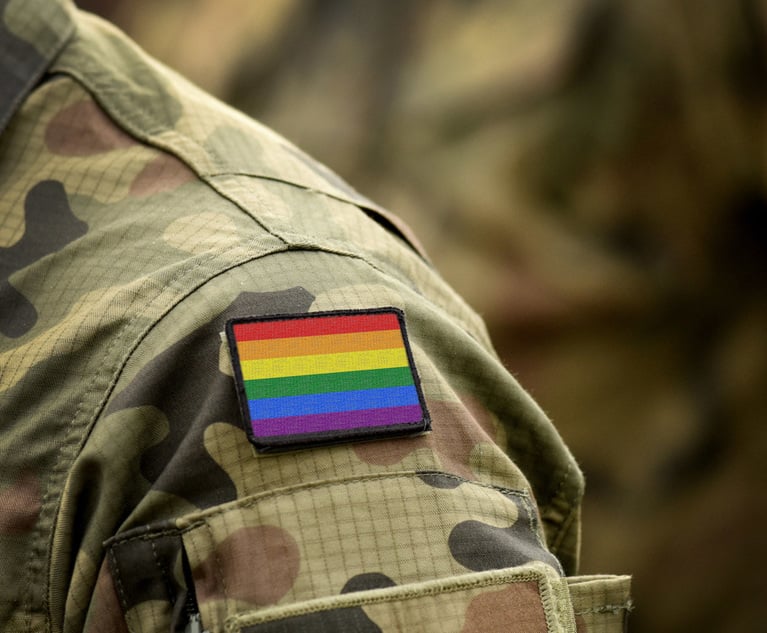Judge Cites National Security in Ending Long-Running Lawsuit Claiming Mass Internet Surveillance
U.S. District Judge Jeffrey White wrote that he accepted the government's position that there was no way for the case to go forward "without grave risk to the national security."
April 25, 2019 at 07:17 PM
3 minute read
 U.S. District Judge Jeffrey White, Northern District of California. Photo: Jason Doiy/ALM
U.S. District Judge Jeffrey White, Northern District of California. Photo: Jason Doiy/ALM
A federal judge in California has knocked out a long-running lawsuit brought on behalf of a group of AT&T customers who claimed their internet communications were swept up in the National Security Agency's surveillance dragnet.
U.S. District Judge Jeffrey White of the Northern District of California sided with government lawyers who had argued that the case originally filed in 2008 could not move forward without “grave risk to the national security.”
Granting the government's motion for summary judgment, White wrote in a public order that “the court finds that it has reached the threshold at which it can go no further.” White also issued a classified order filed under seal, which he said went into further detail on the government's national security defenses. The ruling disposes of the plaintiffs' remaining claims that the government's collection of plaintiffs' communications violated the Wiretap Act and the Stored Communications Act. White had previously dismissed the plaintiffs' constitutional claims.
The plaintiffs' description of the government's surveillance mechanism at issue in the case relied in part on the declaration of Mark Klein, a retired AT&T technician who reported that traffic from the company's internet backbone was routed to a secret room controlled by the government. White wrote Thursday that Klein's declaration and those of the plaintiffs' experts didn't support their claims of illegal government surveillance.
“The limited knowledge that Klein does possess firsthand does not support plaintiffs' contention about the actual operation of the data collection process or the alleged agency role of AT&T,” White wrote. “Klein can only speculate about what data were actually processed and by whom in the secure room and how and for what purpose, as he was never involved in its operation.”
Plainitiffs were represented in the case by San Francisco lawyer Richard Wiebe and lawyers at the Electronic Frontier Foundation.
Wiebe said Thursday that the court's decision “makes it impossible to ever litigate these mass surveillance programs against the government.” Wiebe said that plaintiffs counsel have been asking for years for an appropriate level of access to classified evidence that the judge has had access to, but have repeatedly been denied.
“Given all the things we know about those programs we have no doubt that the secret evidence shows that these programs exist in the fashion we described them,” Wiebe said.
In an emailed statement, EFF's Cindy Cohn said that the plaintiffs were disappointed the case was dismissed based on state secrecy grounds and that they intend to appeal. “The American people deserve to know whether mass surveillance is legal and constitutional,” Cohn said. “Instead of proceeding to the legal merits of the government's programs, the court deferred to the government's state secrecy arguments.”
Read White's decision:
[falcon-embed src="embed_1"]
This content has been archived. It is available through our partners, LexisNexis® and Bloomberg Law.
To view this content, please continue to their sites.
Not a Lexis Subscriber?
Subscribe Now
Not a Bloomberg Law Subscriber?
Subscribe Now
NOT FOR REPRINT
© 2025 ALM Global, LLC, All Rights Reserved. Request academic re-use from www.copyright.com. All other uses, submit a request to [email protected]. For more information visit Asset & Logo Licensing.
You Might Like
View All
After Solving Problems for Presidents, Ron Klain Now Applying Legal Prowess to Helping Airbnb Overturn NYC Ban
7 minute read
DOJ, 10 State AGs File Amended Antitrust Complaint Against RealPage and Big Landlords
4 minute read
Special Counsel Jack Smith Prepares Final Report as Trump Opposes Its Release
4 minute read
Pentagon Settles Suit Seeking to Clear Records of Service Members Discharged for Being LGBTQ
3 minute readTrending Stories
- 1Meta Hires Litigation Strategy Chief, Tapping King & Spalding Partner Who Was Senior DOJ Official in First Trump Term
- 2Courts Beginning to Set Standards for Evidence Relying upon Artificial Intelligence
- 3First-Degree Murder Charge May Not Fit Mangione Case
- 4Legal Tech's Predictions for Legal Ops & In-House in 2025
- 5SDNY US Attorney Damian Williams Lands at Paul Weiss
Who Got The Work
Michael G. Bongiorno, Andrew Scott Dulberg and Elizabeth E. Driscoll from Wilmer Cutler Pickering Hale and Dorr have stepped in to represent Symbotic Inc., an A.I.-enabled technology platform that focuses on increasing supply chain efficiency, and other defendants in a pending shareholder derivative lawsuit. The case, filed Oct. 2 in Massachusetts District Court by the Brown Law Firm on behalf of Stephen Austen, accuses certain officers and directors of misleading investors in regard to Symbotic's potential for margin growth by failing to disclose that the company was not equipped to timely deploy its systems or manage expenses through project delays. The case, assigned to U.S. District Judge Nathaniel M. Gorton, is 1:24-cv-12522, Austen v. Cohen et al.
Who Got The Work
Edmund Polubinski and Marie Killmond of Davis Polk & Wardwell have entered appearances for data platform software development company MongoDB and other defendants in a pending shareholder derivative lawsuit. The action, filed Oct. 7 in New York Southern District Court by the Brown Law Firm, accuses the company's directors and/or officers of falsely expressing confidence in the company’s restructuring of its sales incentive plan and downplaying the severity of decreases in its upfront commitments. The case is 1:24-cv-07594, Roy v. Ittycheria et al.
Who Got The Work
Amy O. Bruchs and Kurt F. Ellison of Michael Best & Friedrich have entered appearances for Epic Systems Corp. in a pending employment discrimination lawsuit. The suit was filed Sept. 7 in Wisconsin Western District Court by Levine Eisberner LLC and Siri & Glimstad on behalf of a project manager who claims that he was wrongfully terminated after applying for a religious exemption to the defendant's COVID-19 vaccine mandate. The case, assigned to U.S. Magistrate Judge Anita Marie Boor, is 3:24-cv-00630, Secker, Nathan v. Epic Systems Corporation.
Who Got The Work
David X. Sullivan, Thomas J. Finn and Gregory A. Hall from McCarter & English have entered appearances for Sunrun Installation Services in a pending civil rights lawsuit. The complaint was filed Sept. 4 in Connecticut District Court by attorney Robert M. Berke on behalf of former employee George Edward Steins, who was arrested and charged with employing an unregistered home improvement salesperson. The complaint alleges that had Sunrun informed the Connecticut Department of Consumer Protection that the plaintiff's employment had ended in 2017 and that he no longer held Sunrun's home improvement contractor license, he would not have been hit with charges, which were dismissed in May 2024. The case, assigned to U.S. District Judge Jeffrey A. Meyer, is 3:24-cv-01423, Steins v. Sunrun, Inc. et al.
Who Got The Work
Greenberg Traurig shareholder Joshua L. Raskin has entered an appearance for boohoo.com UK Ltd. in a pending patent infringement lawsuit. The suit, filed Sept. 3 in Texas Eastern District Court by Rozier Hardt McDonough on behalf of Alto Dynamics, asserts five patents related to an online shopping platform. The case, assigned to U.S. District Judge Rodney Gilstrap, is 2:24-cv-00719, Alto Dynamics, LLC v. boohoo.com UK Limited.
Featured Firms
Law Offices of Gary Martin Hays & Associates, P.C.
(470) 294-1674
Law Offices of Mark E. Salomone
(857) 444-6468
Smith & Hassler
(713) 739-1250








